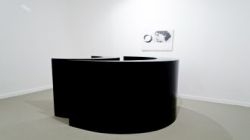
Deganit Berest / Virginia Woolf
Deganit Berest
Born in Petach Tikva, 1949
Lives and works in Tel Aviv
Virginia Woolf is one of the 39 women in honor of whom the table is set in Judy Chicago's The Dinner Party. While Chicago was intent on creating a female canon on the West Coast of the United States, Deganit Berest was working in Israel on images devoted to Virginia Woolf and her book Orlando. These works, which have acquired an iconic status in the context of Israeli art, reveal Woolf's impact on Berest's political and artistic worldview. The exhibition, which opens with Michal Na'aman's work Rosa Luxemburg, Jonah the Prophetess, Queen Leer (1975), ends with Berest's works, which delineate a circle around Woolf. These three works, which were created during the 1970s, capture the beginning of the new era to which this exhibition is dedicated: four decades of artistic creation marked by a reshuffling of the gender cards that defined the art world for many centuries.
Virginia Woolf
1882, London, England
1941, Sussex, England
In 1904, following her father's death, Virginia Woolf began publishing articles in the Times Literary Supplement, and went on to publish hundreds of articles and major literary works. Her oeuvre is considered central to modernist literature, alongside the works of Marcel Proust and James Joyce. In her 1929 book A Room of Her Own, which constitutes an important milestone in feminist thought, Woolf articulated the obstacles and prejudices that must be confronted by women writers, and argued that women are in need of a personal capital in order to create. In 1938, following the rise of fascism in Europe, Woolf wrote the essay "Three Guineas," which examined the connection between women's right for education and work and between the promotion of peace, liberty, and justice. Woolf was seriously engaged with feminist issues, and her books reflect modes of female experience and consciousness as an alternative to the patriarchal perception of reality. Her book Orlando (1928) follows the life of its protagonist as he moves between different occupations, historical periods, and social classes, as well as different sexual identities. In 1941, after completing her last novel, Between the Acts, Virginia Woolf ended her life by drowning herself in a river.